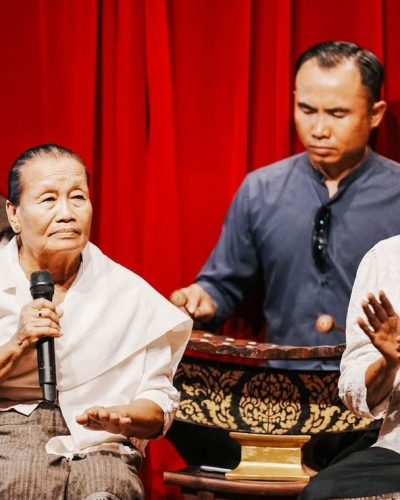Sweet relief as jumbo healed with honey
A chance encounter has turned into a heartwarming act of care for an injured Thai elephant.
When a neighbour of Asian Trails’ Chairman Luzi Matzig returned from a cruise aboard the RV River Kwai, he shared a story about visiting the Somboon Legacy Foundation, an ethical non-profit, elephant camp in Kanchanaburi province that provides lifelong care for four elderly elephants aged between 60 and 90.

One of the elephants, Kham Phaeng, had been suffering from a leg wound sustained before being rescued. Luzi’s neighbour – who imports Manuka honey from New Zealand – suggested using the honey that has powerful antibacterial and healing properties to treat the jumbo.
This neighbourly connection led to Asian Trails receiving some of the honey and our staff joined the first RV River Kwai cruise of the season to deliver it to the foundation. Sixty-year-old Kham Phaeng had the precious honey applied to her wound in the presence of our team.


Caring for elephants is a central part of Asian Trails’ commitment to ethical wildlife practices and this is closely monitored during the company’s audits of all elephant camps included in our tours.
The assessment includes training all staff to understand the complexities of wild elephants in captivity; the relationship between elephants and mahouts regarding safety; the expectations of clients who are following animal welfare guidelines; and the ethical experiences visitors enjoy when they visit elephant camps that forbid riding and humans bathing the animals.
During a recent audit of the Somboon Legacy Foundation, the Asian Trails’ team arrived as the elephants were bathing riverside. Our staff were able to view the jumbos from an elevated platform so the animals could enjoy their dip without human intrusion.

The jumbos then leisurely returned to a shaded wooded area, where their mahouts fed them. All four elephants are very calm and appear to be content and their bond with their mahouts remains strong, as the handlers are able to manage them easily using voice commands.
Although Kham Phaeng’s leg wound has improved, she still has some smaller wounds that are healing, to which her mahout has applied the honey.

Besides viewing the resident elephants, the Somboon Foundation has an excellent educational centre where children and adults alike can learn about elephants and their lives in captivity.
There are many interactive exhibits, including one where flapping a model elephant’s ear on a display panel triggers lights that illustrate how an elephant’s natural cooling system works.
Visitors can also see demonstrations of how elephant dung is transformed into paper and participate in a hands-on workshop to create paper products from elephant waste.
This experience not only reinforces Asian Trails’ Responsible Wildlife Policy – which supports ethical elephant camps that provide excellent care with minimal human interaction – it also allows visitors to witness the sanctuary’s vital role as a resting home for elephants with difficult pasts and health conditions that prevent them from returning to the wild.

For instance, Kam Phaeng was rescued by the foundation from a trekking camp in Pattaya where tourists had ridden her on a heavy wooden seat. She had spent the last decade of her life chained up by 15-cm-long chains on one front and one rear leg. Therefore, she was never able to sleep lying down.
She has now gained weight and enjoys the forested environment of the refuge, a perfect replication of an elephant’s natural habitat with trees, plants, ponds and a river that provide respite from the hot sun, plus opportunities to forage and stimulate the mind.

To book a tour to the Somboon Legacy Foundation or any of the other ethical elephant camps Asian Trails promotes, please contact Asian Trails Thailand.
Watch the video or learn more about Asian Trails’ sustainable initiatives here.





















































